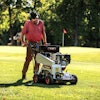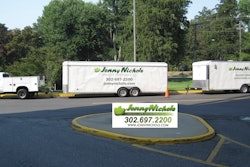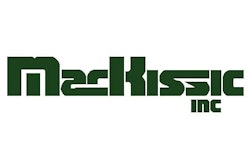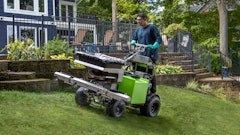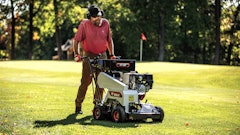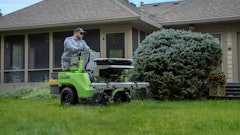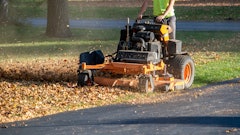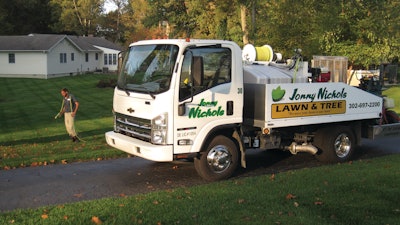
Jonny Nichols Landscape Maintenance is growing again. Like most landscape companies, Jonny Nichols was knocked back a bit in 2009. It has been a steady uphill climb ever since, but things are really starting to pick up. "We're up around 10% this year and feel very blessed," says Jonny Nichols, co-owner of the Dover, DE-based company. "We were up 7% last year. We're very close to where we were in 2007."
There's a blend of excitement, confidence and relief in Nichols' voice as he shares this news. He's thrilled that market conditions are much improved. However, he's well aware that he's competing in a tough, tough market. "Seven of the biggest companies in the country are within 45 miles of me," Nichols points out. And then there's the flood of average-sized companies he also competes against.
Still, Nichols remains optimistic about his company's future. In fact, his goal is to open a second branch and grow total company sales by 200% over the next five years. Ambitious? Yes. But Nichols says he has a plan that makes it realistic.
"I firmly believe that the building industry has stabilized in our market, but the market is so saturated with landscape contractors that we want to put our focus on where we can best add to our bottom line," Nichols says. "That's in lawn care and commercial property maintenance."
Good call, because the lawn care and commercial maintenance industries are expected to continue growing over the next several years. But just because a market is growing doesn't mean your landscape company will automatically grow too. Nichols understands this. He and his partner/father, Jon Sr., run an "open book" company. "We have a plan for growth—and every employee is focused on it," Nichols says. "We constantly discuss it at our weekly meetings."
A big part of the plan is finding ways to be different—and also finding customers that want to be different.
Search for your sweet spots
At 17 employees strong, Jonny Nichols Landscape Maintenance serves a mix of commercial and high-end residential clientele (30/70). Then, 50% of sales come from installation projects, 30% from lawn care and 20% from maintenance. Lawn care is almost entirely residential, while maintenance and installation provide a pretty even mix.
Whether talking about commercial or residential, Nichols says his company found its groove when it adopted a more selective approach. "We only service high-end residential accounts that want our full suite of services," Nichols points out. "We offer an Estate Package. This involves weekly mowing; spring, mid-summer and fall cleanups; spring irrigation start up, mid-season check and fall winterization; along with a lawn care and IPM (integrated pest management) program. We want the residential client who cares a lot about what their property looks like."
The same holds true on the commercial side. Jonny Nichols services a mix of businesses including banks, restaurants (some chains and franchises) and medical facilities. Again, it's a matter of identifying clients whose goals are in alignment with Jonny Nichols'.
"Whether the client contacts us or we contact them, we conduct a thorough interview to make sure it's a good fit before we meet with them," Nichols explains. "While on the phone for that first conversation, we want to find out if they are willing to pay for quality service. We let them know what we will give them for their money. Communication is our biggest thing. We want a proactive client that will bring issues to our attention. We want commercial clients that are as focused on the outcome as we are. You can't just look at the price or bottom line."
The sales process is a little different in Nichols' lawn care division, although the objective is the same as in maintenance: identify clients that value quality service. Most sales leads are in-bound—primarily generated from people seeing Nichols' trucks on the road, along with Google searches.
When a call comes in for lawn care, Nichols' administrative assistant, who is responsible for answering the phone, asks the prospect some basic questions. She then measures the prospect's property via satellite imagery (Real Green Measurement Assistant). "The whole process takes just three to five minutes," Nichols points out. "There's no need to go to the trouble of driving to the property, unless the prospect requests it, of course. As soon as she hangs up the phone, our admin assistant emails an estimate to the client. We have an 85% close rate."
Nichols says their goal is to get a new prospect on a complete lawn care program, which includes three to six fertilization visits throughout the year, in addition to weed control. Then, that original estimate also offers additional services like tree/shrub care and grub control.
Making organics work
Three years ago, Jonny Nichols Landscape Maintenance made a bold move in its lawn care division. "We switched over to a Holganix-based lawn care program," Nichols says. The Holganix product uses natural microorganisms designed to improve overall soil health. It is marketed as a more "natural" solution for lawn care, allowing for a dramatic reduction in fertilizer usage. After three years of using the product, Nichols has found that to be true.
"Holganix is a soil amendment that provides nutrients the soil needs," Nichols explains. "The end result for us has been improved root growth and less need for nitrogen (fertilizer)." Nichols has also noticed improvement in the ph values on many properties. "So we've had less need for lime and even grub control."
The Holganix product is definitely working from an efficacy standpoint, Nichols states. Getting it to work from a profitability standpoint took some work. "Holganix recommends a four-step process," Nichols says. "That was a concern for me because we had been selling six steps. We worked with Holganix to come up with a six-application program. We start on February 15 and end around December 15."
Fertilizer is still part of the new lawn care program, but it is a Holganix product called Blue Sky that is applied four times a year. As pointed out earlier, the amount of nitrogen, lime and grub control needed has now been reduced. Nichols also expects the need for herbicides to lessen in time. This past year (2013) was tough, however. "We had 77 inches of rain by the end of April," Nichols says. "The crabgrass really popped last summer. So we had to apply more herbicide than we'd expect."
You have to do what's necessary to keep customers happy, right? With respect to the shift to Holganix, this was a bit of a risk, Nichols relates. "We're one of the first lawn care companies in our area to start fully using an organic-based program," Nichols adds. "Many customers hear the term 'organic' and get nervous. But the results have been great, so our market has been quite receptive to it."
20 years at it, but just getting started
Most successful landscape contractors have taken risks at some point. Nichols has not been an exception. He decided to open a garden center in 2008 despite nearby competition from Walmart, Home Depot and Lowe's. "The economy was weakening then, and I thought a garden center would be one more way to generate some revenue while also leading to more installation jobs," Nichols recalls. "Overall, the experience has been positive, but nothing great."
Another risk, which all contractors face, is when hiring a new employee. Much like when qualifying prospective clients, Nichols and his team invest considerable time in qualifying a prospective employee.
"Before I even meet a potential new employee, they have already been through two interviews," Nichols explains. "Our admin assistant conducts an hour-long, in-person interview. We call this our 'get to know you' interview. If we feel like the person would be a good fit for our team, we invite them back for a second interview. Here the applicant meets with the department manager. We're looking to learn more about the applicant's skills and experience. If that goes well, a third interview is set up where myself, the department manager and admin assistant all sit with the applicant."
In that third interview, Nichols is looking for consistency. "We go over a lot of the same things that were discussed in the first two interviews. We ask about the applicant's experience and goals. We discuss how we are a team and what our goals are.
"Every member of our team must be on the same bus pulling in the same direction," Nichols continues. "In looking back over my first 20 years in business, I credit our success to two things: the hard work of me and my employees, and my business coach, Tony Bass, who I first met 18 years ago."
In looking ahead to the next five years, Nichols is optimistic—and some might think a little too ambitious. He has a great team, though, along with a clear plan for how to create some competitive separation and thrive in a saturated market. It has worked pretty well thus far. With some more hard work, it could very well continue to deliver.



